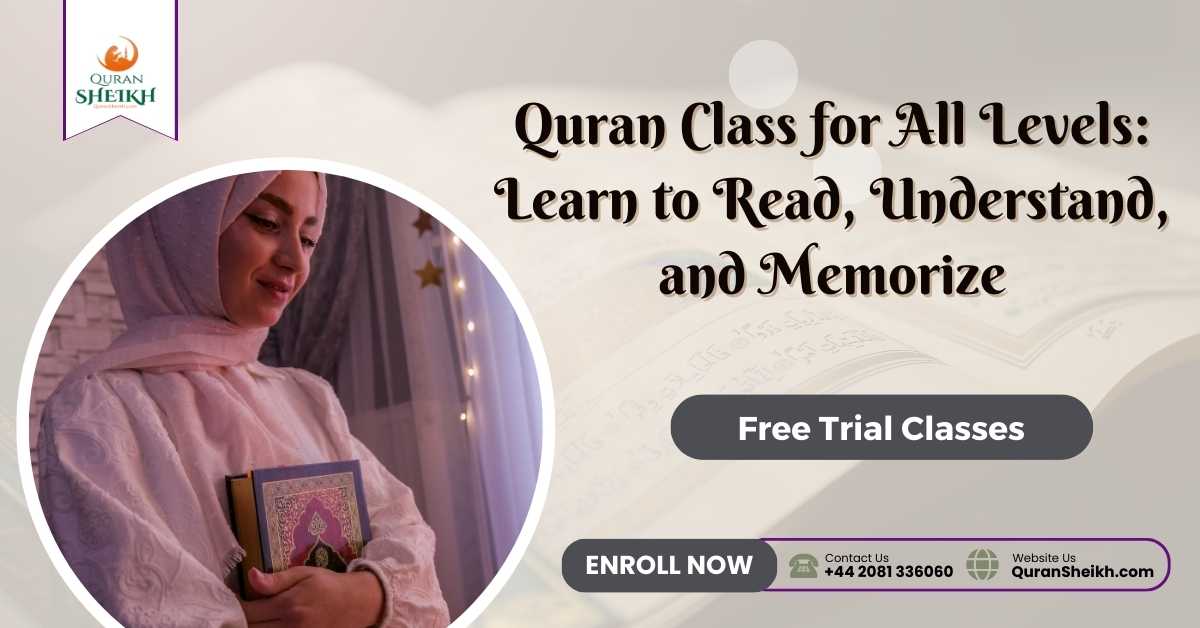Introduction to Quranic Studies
Quran Class: The field of Quranic Studies involves the exploration of the profound teachings and wisdom found within Islam’s holy scripture, the Quran. Muslims worldwide place great importance on the Quran, considering it as the ultimate divine scripture.
Exploring and comprehending the Quran not only enriches one’s knowledge of Islam but also offers precious perspectives on diverse dimensions of life and spirituality.
Throughout this article, we will take a voyage delving into the depth of Quranic Studies, examining its importance, organization, recurring topics, and real-life implementations. We will also address common challenges and misconceptions, and provide resources for further study.
This article endeavors to give a thorough introduction to Quranic Studies and its importance in today’s society, specifically catering to both students of Islam and those with a curiosity about its message.
Join thousands of Muslim Families who love learning Quran, Arabic and Islamic Studies from the comfort of their Homes.
1. Introduction to Quranic Studies

1.1 Importance of Quranic Studies
Initially, Quranic studies may appear daunting; however, they bear immense significance in comprehending Islam and its teachings. The study of the Quran provides us with valuable insights into the principles and values of Islam, making it the religion’s sacred text. Quranic studies help Muslims deepen their connection with the Quran and develop a profound understanding of their religion.
1.2 History and Development of the Quran
The Quran didn’t miraculously appear one day; it has a fascinating history and development. Understanding the journey of the Quran helps us appreciate its significance even more.
From its revelation to Prophet Muhammad through the angel Gabriel in the 7th century, to its compilation and preservation, the Quran’s story is filled with rich historical context. Exploring this history not only enhances our knowledge but also adds depth to our appreciation of the Quran.
2. Understanding the Structure and Content of the Quran

2.1 Organization of the Quran
Ever wondered why the Quran is organized the way it is? Understanding its structure can make it easier to navigate and comprehend. Within the surahs, there exist ayahs that form the individual verses of the Quran.
Each surah and ayah has a unique message, and learning about their arrangement helps us better understand the Quran’s flow and thematic structure.
2.2 Surahs (Chapters) and Ayahs (Verses)
Surahs and ayahs are like the building blocks of the Quran. Surahs can vary in length, with some being just a few lines while others span multiple pages. Each surah carries a distinct message and covers various topics, from faith and worship to morality and social issues.
Similarly, ayahs are like nuggets of wisdom, providing guidance on different aspects of life. Exploring the depth and breadth of surahs and ayahs can be a rewarding journey.
Quran Memorization Course Online with an Arab teacher with 30% Off
3. Importance of Recitation and Memorization of the Quran

3.1 Benefits of Quranic Recitation
The act of reciting the Quran goes beyond mere pronunciation practice; it encompasses immense advantages for both individuals and communities alike. Reciting the Quran helps in spiritual upliftment, enhances mindfulness, and enables us to connect with the divine message. Moreover, the beautiful rhythm and melodies of the recitation are a source of tranquility and bring peace to our hearts.
3.2 Techniques for Effective Quran Memorization
Memorizing the Quran is a remarkable feat and an act of devotion. The verses are not only stored within our hearts, but also serve as a guide for applying their teachings.
Memorization techniques, such as repetition, understanding the meaning behind the verses, and seeking guidance from qualified teachers, can make the process more manageable. By mastering these techniques, we can embark on a lifelong journey of Quranic memorization.
4. Exploring the Historical Context of Quranic Verses
4.1 Understanding the Time and Place of Revelation
Gaining a thorough understanding of the Quranic messages necessitates an exploration of the historical backdrop against which its verses were disclosed. Understanding the time and place of revelation helps us appreciate the challenges and circumstances that influenced the Quranic teachings.
By diving into the historical backdrop, we gain a deeper understanding of the wisdom and relevance of the verses in our modern lives.
4.2 Analyzing the Life of Prophet Muhammad
Islamic development and propagation were greatly influenced by Prophet Muhammad, who received the Quranic revelations. Analyzing his life, character, and teachings provides us with valuable insights into the Quran.
Learning about his experiences, struggles, and triumphs helps us understand the Quran in the broader context of his mission and the societal changes he sought to bring about.
Embarking on a Quranic studies journey opens the doors to a world of knowledge, spirituality, and guidance. It’s an opportunity to delve into the profound teachings of the Quran, connect with our faith, and enrich our lives with its wisdom.
5. Studying the Themes and Messages of the Quran
Understanding the themes and messages of the Quran is crucial when it comes to studying it. From personal spirituality to social justice, the Quran offers comprehensive guidance on a diverse array of subjects. By delving into its themes, you can gain a deeper appreciation for the profound wisdom it contains.
5.1 Monotheism (Tawhid) and the Oneness of God
The Quran’s teachings emphasize the centrality of monotheism, which is the belief in God’s oneness. This theme emphasizes the significance of recognizing God as the one and only divine being.
By analyzing the Quranic verses that discuss monotheism, a deeper comprehension of Islam’s core principles and the significance of an individual bond with God can be fostered.
5.2 Ethical and Moral Guidance in the Quran
Another key theme in the Quran is ethical and moral guidance. The Quran encompasses a holistic structure for attaining righteousness, offering counsel on matters including integrity, benevolence, fairness, and empathy.
By studying this aspect of the Quran, you can gain practical insights into how to navigate various moral dilemmas and make choices that align with Islamic principles.
6. Applying the Teachings of the Quran in Daily Life
Engaging with the Quran goes beyond a mere intellectual pursuit; it imbues our lives with transformation and fosters spiritual development. Understanding how to apply its teachings in our daily lives is essential to truly benefit from its wisdom.
6.1 Implementing Quranic Teachings in Personal Behavior
The main focus of this section is on integrating the teachings of the Quran into our individual conduct. From developing a strong sense of character to practicing gratitude and patience, the Quran provides practical advice on how to cultivate positive traits. By reflecting on these teachings and putting them into practice, we can strive to become better individuals.
6.2 Social and Community Impact of Quranic Principles
Beyond personal behavior, the Quran also emphasizes the importance of positively impacting society and fostering strong communities. It encourages believers to promote justice, equality, and compassion in their interactions with others. Our communities can experience a positive transformation by actively implementing the Quranic values of social justice, generosity, and tolerance.
7. Challenges and Misconceptions in Quranic Interpretation
While studying the Quran may be a rewarding journey, it is not without its challenges. In interpreting the Quran, this section delves into several common obstacles and misconceptions that frequently arise.
7.1 Controversial Verses and Their Interpretations
Controversial verses in the Quran have often been subject to various interpretations, leading to differing viewpoints within the Islamic scholarly tradition.
This section explores some of these verses and the different ways they have been understood throughout history, shedding light on the complexity of Quranic interpretation.
7.2 Addressing Misconceptions about the Quran
Unfortunately, the Quran is frequently misunderstood or misrepresented. The purpose of this segment is to dismantle various misconceptions about the Quran, including the erroneous belief that it advocates for violence or gender oppression. By addressing these misconceptions, readers can gain a clearer perspective on the true teachings of the Quran.
8. Resources for Further Quranic Study
For those eager to continue their Quranic study, this section provides recommendations for further resources to deepen their understanding.
8.1 Recommended Books and Commentaries
A list of recommended books and commentaries can guide readers in selecting additional sources that explore the Quran’s teachings. These resources, written by respected scholars and experts, provide valuable insights and analysis to further enhance one’s study.
8.2 Online Platforms and Courses for Quranic Study
In the digital age, online platforms and courses offer convenient ways to continue Quranic study. This section highlights reliable online resources, including websites and courses, that provide structured learning opportunities and access to a broader community of learners.
By utilizing these available resources, you have the opportunity to commence a life-long exploration of Quranic research, enhancing your comprehension of Islam and fostering a profound bond with the sacred knowledge it encompasses.
In conclusion, Quranic Studies offers a rich and transformative exploration of the teachings and guidance found within the Quran. By studying its structure, understanding its historical context, and delving into its themes and messages, we gain a deeper appreciation for the profound wisdom contained within this sacred scripture.
Utilizing the wisdom found in the Quran within our daily lives grants us the ability to live with greater moral integrity, empathy, and fulfillment. While challenges and misconceptions may arise, the resources available for further Quranic study empower us to continue our quest for knowledge and understanding.
May our journey through Quranic Studies inspire us to seek truth, embrace wisdom, and embody the timeless principles of the Quran in all aspects of our lives.
How can I memorize the whole Quran?
Memorizing the Quran is a noble goal, and it is achievable with sincerity, dedication, and the right approach. Here are some tips:
- Start small. Don’t try to memorize too much too soon. Set a realistic goal for yourself, such as memorizing one page per day or one juz per week.
- Revise regularly. Once you have memorized a passage, don’t forget it! Revisit it regularly to keep it fresh in your mind.
- Use different methods. There are many different ways to memorize the Quran. Experiment with different methods to find what works best for you.
- Seek help from a mentor. If you are struggling to memorize on your own, consider seeking help from a mentor who can guide you and provide support.
Most importantly, remember that memorizing the Quran is a journey, not a destination. Be patient with yourself and enjoy the process.
How long does it take to memorize 1 page of the Quran?
The amount of time it takes to memorize one page of the Quran varies depending on the individual’s learning style, motivation, and dedication. Some people may be able to memorize a page in as little as two weeks, while others may take several months. It is important to be patient and consistent with your memorization efforts, and to seek help from a qualified Quran teacher if needed.
Here are some tips for memorizing one page of the Quran:
- Break down the page into smaller sections. This will make it easier to memorize each section individually.
- Repeat each section multiple times. The more you repeat something, the better you will remember it.
- Use mnemonic devices to help you remember the verses. For example, you could associate each verse with a specific image or song.
- Review the page regularly to maintain your memorization.
With hard work and dedication, anyone can memorize the Quran. It is a rewarding experience that will bring you closer to Allah.
Do I need a teacher to memorize Quran?
Whether or not you need a teacher to memorize the Quran depends on your individual circumstances and learning style. Some people find it helpful to have a teacher to guide them, while others are able to memorize the Quran on their own.
There are many benefits to having a teacher when memorizing the Quran. A good teacher can help you to develop a structured memorization plan, provide feedback on your progress, and answer any questions you may have. They can also help you to overcome any challenges you may face along the way.
However, it is not essential to have a teacher to memorize the Quran. There are many people who have successfully memorized the Quran without a teacher. If you are determined to memorize the Quran on your own, there are many resources available to help you, such as books, websites, and online courses.
Ultimately, the decision of whether or not to have a teacher when memorizing the Quran is a personal one. If you are unsure, it is a good idea to talk to a qualified Quran teacher or scholar to get their advice.
Best Quran memorization program with qualified Arab tutors and get 30% OFF, Quran classes for Kids
FAQs
1. Why is Quranic Studies important?
Gaining knowledge through Quranic Studies enriches one’s comprehension of Islam and the teachings of the Quran. It provides insights into the historical context, themes, and messages of the Quran, enabling individuals to apply its wisdom in their daily lives and build a strong spiritual connection with God.
2. How can I memorize the Quran effectively?
Memorizing the Quran requires dedication and practice. Some effective techniques include breaking the Quran into smaller portions, reciting regularly, and seeking guidance from qualified teachers or scholars. Additionally, utilizing mnemonic devices, along with consistency and patience, can greatly aid in the memorization process.
3. Are there different interpretations of the Quran?
Yes, there are various interpretations of the Quran due to linguistic nuances, cultural differences, and individual perspectives. Scholars employ methodologies such as studying the Arabic language, considering historical context, and consulting classical commentaries to interpret the Quran. It is important to approach interpretations with an open mind and rely on credible sources.
4. Where can I find reliable resources for Quranic study?
There are several reliable resources available for Quranic study. These include reputable books and commentaries written by renowned scholars, online platforms offering courses and lectures on Quranic Studies, and local Islamic centers or universities that offer Quranic study programs. It is advisable to seek recommendations from knowledgeable individuals or scholars for trusted resources.


